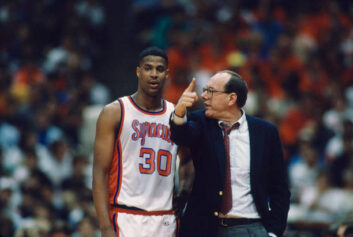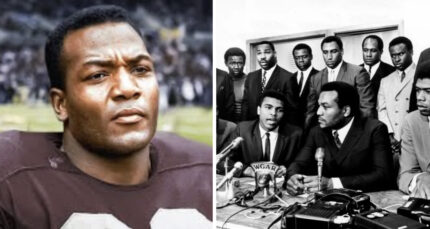My allegiance to the Big East was shaped by growing up in Queens, NY in the Golden-Era 80s and 90s and existing within the geographical and cultural framework of basketballs Northern Mecca. It was back when St. Johns, Georgetown and Syracuse played basketball with the same perfect, violent, rugged symphonic harmonies that NWA used in its musical expression.
Thats just how it was back then. Most Tri-State area basketball fans had a plethora of burgeoning, high profile and culturally-relevant Big East schools to ride with and rock its university gear like it was the uniform for some athletic cult, gang or street enterprise.
Back then, in my part of town, that Northeastern pocket of Americas basketball bread basket got covered and marketed like it was the only brand of basketball in existence, but it only owned a small percentage of the national college basketball fans.
Big East fans tended to hate the ACC which traditionally owned the majority of love coming from basketball fans. The Big East was comprised of Northeastern schools that were considered the new bad boys on the block. A new regime that prided itself on defensive toughness and intimidation. The ACC was the already-in-place motor to college basketballs rise as a viable and highly-followed spectator sport. That can be directly attributed to Coach Dean Smith and his four decades of college basketball dopeness.
Just as John Thompson and his Georgetown Hoyas held it down as the emerging flagship program in the Big East and eventually became an iconic program in college basketball lore, Smiths Tar Heels set the standard everywhere else and he was the Lord of ACC basketball. The Powder Blue was an institution and basketball culture all to itself, and before the ascension of Duke, stood supreme among the many historically prestigious Atlantic Coast Conference basketball programs.
The road to NBA success and big-time basketball fever never ran through Washington DC or New York City.
Stories of playground legends, hardwood heartbreaks, the collision of drugs and basketball and b-ball as an extension of a harsh and rough-n-tumble street existence, are owned by the Northeast.
But Smith and the presence of his Carolina program (which ESPN almost forced you to appreciate and admire, regardless of where you grew up) made you acknowledge UNC as the bloodline of the North Carolina sports community and the center of the college basketball planet.
Thanks to Dean Smith, dudes in Brooklyn were rocking Carolina Tar Heel hats and starter jackets on a snowy January afternoon, as the steps of their trudge through New York Citys concrete jungle were drowned out by the rickety rowdiness of the train above darting through the city. Despite the difference in climate, infrastructure and philosophy, the basketball connection and appeal of UNC was kept alive by the man who revolutioned the game with “The Four Corners”, sent 25 first-rounders to the NBA, won two National Titles and presided over the most famous and diversely-appreciated basketball program in NCAA history. He was the basketball Berry Gordy. A coach, engineer, father, motivator, disciplinarian and expert at his craft. He built a kingdom that would become the standard for every successful college basketball enterprise that followed.
A few coaches have won more games (Smith has 879 career, but Mike Krzyzewski is the NCAA Division I leader with 1,003). There are coaches with more NCAA titles (Jim Calhoun has three). However, its consensually agreed that Smiths untouchable stature and the obvious admiration that people share for Smith comes from his ability to transcend the role of coach and basketball innovator.
Bobby Knight is credited with turning boys to men, just as Smith did. Knight, however, didnt have the finesse that Smith possessed. Knight was a bull in a China shop. He rubbed people the wrong way, while helping them succeed. Smith had a way with people. His style was reminiscent of a Steph Curry jumper; It stung like hell, but went down smooth, deadly and efficiently.
Smith is a throwback to the lost art of coaching. The pressure to win and raise money and produce instantly has erased the overall nurturing and human development that coaches like Smith were lauded for. He held players accountable and embraced them into his Tar Heel family, never letting go, even after they completed their basketball obligations to the university.
Smiths talents as a coach were undoubtedly birthed in his participation on winning teams as a player. Born Feb. 28, 1931, in Emporia, Kansas, the son of public school teachers, Smith graduated from the University of Kansas with a communications degree in 1953. He played for the Jayhawks teams that won the NCAA title in 1952 and finished second the next year.
ESPN announcer Dick Vitale says Smiths unique ability to communicate with kids and test time, last long and create a legacy for himself is something that cant be ignored. Smith could take different players, with different mind frames from different generations and understand them all, Vitale reflected.
The dignified way Smith treated everyone from his finest player to the mascot, will also be an integral part of his legacy. From 1961-1997 Smith built North Carolina into a basketball jewel, a state treasure. In the process, it helped turn fellow ACC squads into college basketball powerhouses.
How many players went to Clemson or Georgia Tech or N.C. State or Wake Forest just so they could face UNC and get revenge? For many of those guyslike the LA Clippers Chris Paultheir only basketball ambition was to play for UNC, but Smith was stocked with blue chip recruits and passed on their services.
Unless you were a Duke fan or an ACC rival, when your team wasnt playing, you rooted for Dean Smith, North Carolina and the trailer load of awesome ballers that made the University a shining example of an honorable basketball factory. A winning program, led by a principled man who achieved incomparable success and longevity.
Dean Smith was an institution. Very few people can leave this earth without a person saying a bad word about them. The deserved pontificating about the on and off-the-court accomplishments of a basketball coaching icon has been ever flowing since Smith passed at the age of 83 on Saturday after battling health issues since 2010.
Roy Williams, the current North Carolina coach who spent 10 years as Smith’s assistant, said Smith “was the greatest there ever was on the court but far, far better off the court with people.”
Smith was in six Final Fours before ever winning the NCAA c’hip. Interestingly enough, he was almost fired, but weathered the storm and received a long overdue blessing from Hoyas player Fred Brown and the basketball gods, as a wiry freshman named Michael Jordan a third option to stars Sam Perkins and James Worthyhit a jumper that lifted Smith to his first title in 1982.
Even if Smith never won a chip, the totality of his contributions to the sport of basketball is second to none There was no one working with analytics in basketball before him. He authored the book Basketball: Multiple Offense and Defense in 1981. He was known for his progressive and logical stances on racism and the death penalty. Smith valued humanity as much as he did basketball. The way he valued an education trumped his thirst for victory. He realized that there was winning in losing as long as you learn from it and grow. His wife, Linnea, accepted the Presidential Medal of Freedom on his behalf from President Barack Obama in November 2013.
“Last night, America lost not just a coaching legend but a gentleman and a citizen,” President Obama said in a statement released by the White House. “When he retired, Dean Smith had won more games than any other college basketball coach in history…and reared a generation of players who went on to even better things elsewhere, including a young man named Michael Jordanand all of us from Chicago are thankful for that.
“But more importantly, Coach Smith showed us something that I’ve seen again and again on the court that basketball can tell us a lot more about who you are than a jump shot alone ever could.”
Coaching icon John Wooden called Smith the worlds best teacher of basketball and Michael Jordan was his finest student Coach taught me the game, Jordan said. Hes like a second father to me.
Most of all, Smith will be known as the king instructor of coaches. ESPNs Dick Vitale calls Smith the Michael Angelo of coaching. Vitale marveled at Smiths substitution patterns, and his ability to spread the court. He was so creative and made such an impact on so many coaches including yours truly, Vitale gushed.
Smith led the Tar Heels to 13 ACC tournament championships, appearances in 11 Final Fours and five national title games. North Carolina won at least 20 games in each of his final 27 seasons and made 23 consecutive appearances in the NCAA tournament.
Under Smiths rule, Southern basketball was as immovable an object as the celebrated NY game, and the New York inner-city kids like NBA analyst Kenny “The Jet” Smith, who went on to play in the ACC, helped spread Carolina fever, in essence, providing UNC with another legion of fans that didnt reside anywhere near Tobacco Road.
“We have lost a man who cannot be replaced, said Dukes iconic coach Mike Krzyzewski, who is like the Kobe to Smith’s Jordan. Coach K studied the master, competed against him and was able to trump him in certain statistical categories, while respectfully acknowledging Smith as the superior pioneer. “He was one of a kind, and the sport of basketball lost one of its true pillars.



